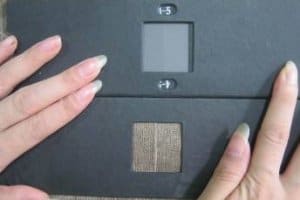
Nowadays, a lot of third party inspection companies are increasing their inspectors’ skills and training how to use special tools to check product quality. For example, during a soft-goods or textile inspection the most important tools that will be used are newton meters, metal detectors, barcode scanners, pantone books, etc. But one of the most important for a soft-goods inspection (along with ceramics, toys, and many other items!) is a grey scale in order to evaluate the color shading or staining.
A grey scale is used for evaluating the color shading between products and client’s approval sample or among pieces in production. Grey scaling has grades 1-5 and increases by half of grade (1, 1 1/2, 2, 2 1/2 and so on..) with 5 being the highest. General speaking, most of overseas clients can accept above grade 4 , while some can accept the grade 3-4.
Another grey scale is for color staining. It mainly is used for evaluating staining after rubbing by wet and dry white cotton cloths, in a professional lab. The worker usually attaches one white cotton cloth to the sample. Then, they will put them together into washing machine and observe the result. An inspector generally can not do this on-site since the equipment and time are limited. Instead, an inspector may perform a rub test for color staining. To do this, the Inspector should prepare 2 pieces of white cotton fabric: one wet and the other dry. The inspector will rub the production sample 10 times with both with a force 9N(1KG).
Expected result:
- There should be no color transfer worse than grade 4 on a grey scale (between the original white cloth and the colored one) after the dry test.
- There should be no color transferred worse than 3-4 on a grey scale (between the original white cloth and the colored one) after the wet test.
In order to get the most from your results, the inspector should make sure to interpret the method and result and explain to the factory clearly. The factory should be able to assist, such as in providing good quality 100% cotton white fabric and providing good room lighting and conditions. In a textile inspection, the inspector’s experience is very important when performing this test, so make sure to use a reputable QC provider!
"When I was applying for a loan to purchase my building as a small business owner in a tough situation, conventional banks said they could not help me. the loan firm from mr lee sat down with me, heard my situation and decided that I was worth taking a chance on. Here we are 5 years later and I have just renewed my loan for another 7 years. I couldn’t have purchased my building without the help of the loan from mr lee and will be forever indebted to them for giving me a chance when no one else would."here is mr lee contact Email: 247officedept@gmail.com Also on whatsApp: +1-989-394-3740So I will advise anyone here looking for a loan to contact mr lee for an assistance of loan fundings.
ReplyDeleteOne other thing with the Chinese suppliers is that coming to terms with them will be a never-ending process. It's a common thing and even anticipated within Chinese culture and businesses. information
ReplyDelete